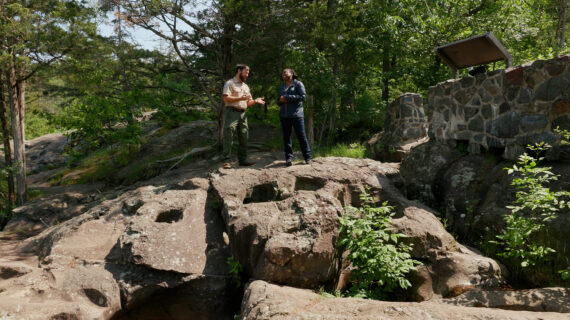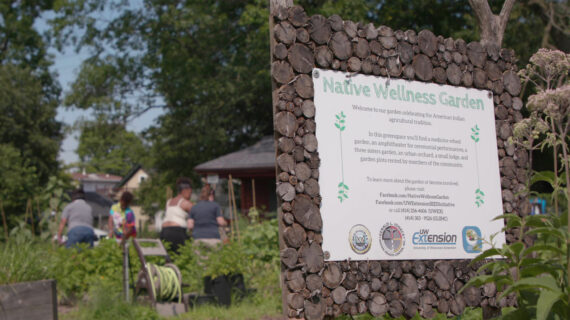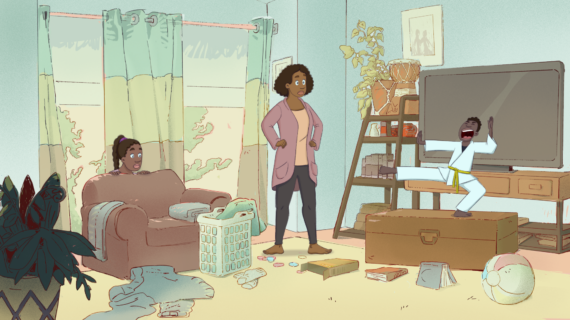Frederica Freyberg:
I'm Frederica Freyberg. Tonight on “Here and Now,” a “First Look” at why some milk producers are scrambling to sell their product. After that our WisContext partners explore the Farm to School nutrition program. Birch tree burglars, they’re sawing their way across northern Wisconsin. It’s “Here and Now” for April 14.
Announcer:
Funding for “Here and Now” is provided, in part, by Friends of Wisconsin Public Television.
Frederica Freyberg:
In our “First Look” tonight, the clock is ticking for more than 75 dairy farmers in Wisconsin who by the end of the month won’t be able to sell their milk to their processor. Grassland Dairy alerted the farmers by letter April 1st that it won’t be able to buy their supply because the Canadian market has dried up saying quote, The Canadian government has put in place several regulations to prevent this trade from continuing. Grassland is now forced to cut back on our milk intake volumes on a very short notice due to not being able to process milk on lines dedicated to our Canadian customers. That letter came as a devastating blow to Wisconsin farmers, including Jennifer and Shane Sauer of Waterloo.
Jennifer Sauer:
When we opened the letter, I'll be honest. There was shock at first. And then Tuesday and Wednesday you thought more about it. A lot of — a lot of tears shed.
Frederica Freyberg:
Jennifer and Shane Sauer are worried they won’t be able to continue running their 120-cow third generation farm if they don’t find a new processor soon.
Jennifer Sauer:
You’ve done a lot of calling to different processors.
Shane Sauer:
Getting the same answer every time.
Jennifer Sauer:
And that answer’s no. They’re full. It seemed like there was some hope with that maybe, you know, somebody will take your milk, but out of the 125 processors that are in Wisconsin, you keep hearing that same answer and that’s no.
Frederica Freyberg:
And 30 days, they say, just has not been enough time to make new plans.
Jennifer Sauer:
Unfortunately, people don’t understand that cows aren’t a machine you can shut down for a week. And when we had 30 days, 30 days is not enough to find another processor. Now we’re down to 11, 12 days, and it’s getting close to time.
Frederica Freyberg:
The Sauers say having to sell the cows would mean more than losing their livelihood. It would mean losing a way of life that’s been in their families for generations and one they hoped to pass on to their children.
Jennifer Sauer:
We put our heart and soul into it 24/7. There’s days we come down here and we don’t even think of it as a job. This is the life we’ve chosen and this is what we know. You have — you’ve dealt with so many different things living on a farm, and to think that, you know, we might have to sell the cows and try to do something different –
Shane Sauer:
Very scary thought.
Frederica Freyberg:
The Sauers are just one of the farm families reeling from the prospect of not being able to sell their milk. This is getting urgent attention from Wisconsin officials. The entire Congressional delegation and Governor Scott Walker sent a letter to U.S. trade representatives and the secretaries of commerce and agriculture saying, quote, this situation underscores how Canada's new pricing policies are not only undermining trade with the United States, but are displacing fresh milk produced by hard-working dairy farmers in Wisconsin and around the country. The letter continues, we urge you to take immediate action to address this dire situation, where apparent unfair trade practices are putting Wisconsin dairy farmers’ livelihoods at risk. We look forward to working with you to break down these trade barriers, enforcing existing rules and improve Canadian market access for our producers in any future trade negotiations. We are joined now by Wisconsin Secretary of Agriculture, Trade and Consumer Protection, Ben Brancel. Thanks for being here.
Ben Brancel:
Thanks for having me.
Frederica Freyberg:
So what kind of response is Wisconsin getting to its call for immediate action on this?
Ben Brancel:
Well, I think the White House is reviewing what is the appropriate avenue to get Canada to really own up and be part of the discussions to deal with this issue.
Frederica Freyberg:
Well, let’s back up and have you help us understand why Canada changed its milk import policies.
Ben Brancel:
Well, Canada itself was reviewing its trade deficit, trade issues. I will say it that way. One of the things they recognized is we had a product from the state of Wisconsin that was moving into Canada. It’s about a $100 million value to the state of Wisconsin. And they took a look at how could we change things so that we wouldn’t have that competition here in our own country. And they changed their pricing structure. And that pricing structure change was targeted specifically to this product. And it comes from New York and the state of Wisconsin.
Frederica Freyberg:
How does it break existing trade rules or constitute unfair trade practices as was suggested in that letter?
Ben Brancel:
Well, we’re supposed to have free and open trade with the country, Canada and the country of Mexico, under the NAFTA agreements and it has worked very, very well for agriculture. But now Canada has not only in dairy, but a couple of items, found unique ways at the provincial level of government, not the national level, but the provincial level of government to put things in place that targets the products coming from the United States and is causing some undue harm and that’s what we’re here talking about today, the harm of some of our dairy producers.
Frederica Freyberg:
So in regard to that, what information do you have that any of the 75 farmers have found alternative processors to sell their milk to?
Ben Brancel:
Well, we’ve been discussing this topic with the processors. We’ve talked to the processor organizations. We’ve talked to the milk handlers. We’ve talked to the farm organizations. Today we’re going to have a discussion with the dairy farmers themselves. And we are opening up every channel possible to see if we have an avenue of success. And there has been reports that we are finding some of the milk a home.
Frederica Freyberg:
Okay. Any indication that farmers if they don’t find that have to start dumping milk?
Ben Brancel:
Well, this is the first time ever in the state of Wisconsin's history, ever, where milk produced here could not find a home. We’re still hoping that that’s going to happen. If they don’t find a home for your milk, I don’t know how you keep producing the product and staying with your livelihood and staying with your farm. And I think it leads some pretty serious decisions for those farmers.
Frederica Freyberg:
Now, this letter that Grassland sent to farmers April 1st apparently came as a surprise to many of those farmers. But was this something that state and federal officials have been watching and working on for months?
Ben Brancel:
Oh, for over a year. Back in early ’16 we started to worry about this change in policy that Canada was putting in place. We immediately started to have discussions with their ambassadors, the embassies, counselor generals. It was going through federal channels. We were trying to make sure that it would not get fully imposed. And we kept worrying about it. And eventually in March, end of March, Canada informed Grassland that that was the last loads of ultra-filtered milk they would be allowing into their country.
Frederica Freyberg:
What did your agency counseling the farmers affected or what kinds of resources should it come to pass that they cannot find a new market?
Ben Brancel:
Well, we want them to talk to us. We will help them walk through some of the decision-making process, what is it that they have to do to disburse the herd or would they sell the cows and keep the heifers with the opportunity to come back into the milking system. What kind of other things do we have to do? Do we have to mediate with the lenders to see if the lenders will help us give those farmers some latitude? So we’re standing at the ready. But most of our energy right now is to hope that that never happens and to work hard to see that it never happens.
Frederica Freyberg:
How bad is this?
Ben Brancel:
It's pretty bad for those farmers. I don’t care what you say about the industry, but when you know what can happen to those farm families, it’s bad.
Frederica Freyberg:
Meanwhile, in the midst of all of this and in an ongoing kind of effort, you’re working to expand markets in Mexico.
Ben Brancel:
Yes, we are, as we have been. We try to find locations where we think there’s an opportunity for products from the state of Wisconsin to be sold and build relationships. Those take time to happen, but we’ve been very, very successful. This state used to be ranked 17 amongst the states of the U.S. Today it’s ranked 12th. So our export market based on the other states and the numbers we’re given has improved.
Frederica Freyberg:
How could any renegotiation of the North American Free Trade Act from the Trump administration affect all of this and Wisconsin?
Ben Brancel:
Well, my hope is when they sit down and they take a look at NAFTA and if NAFTA allows this to happen and this is not — I just think there’s a spirit of the law and there’s the letter of the law. And I think Canada violated the spirit of the law. And if you have to really get to the letter of the law, then we have to open up that NAFTA agreement and make sure that this does not happen again, where they can target a very specific product and cause undue harm to our businesses here and certainly our farm families.
Frederica Freyberg:
Meanwhile, just ahead we are looking at the Department of Agriculture’s Farm to School program and that is a program that we started looking at because there’s a budget item that cuts the coordinator position and the advisory council for that program. But that was a cut that actually you recommended as part of kind of reining in costs in your agency?
Ben Brancel:
Well, the legislature required every agency to review all of its programs and find out if there was an opportunity for a 5% reduction. We listed a whole variety of items on that list for the legislature’s consideration and that was one of them, yes. It was one of those. And it’s because the position was vacant and had been vacant. We now have two other councils besides the advisory council working on this project. And we have other employees that we’ve redirected to work on Farm to School programs.
Frederica Freyberg:
All right. Secretary Ben Brancel, thanks very much for your time and good luck.
Ben Brancel:
Thank you.
Frederica Freyberg:
In tonight’s segment featuring WisContext journalists a look at the Wisconsin Department of Agriculture's Farm to School program in Wisconsin.
Tim Zander:
Last year we did green beans. I think we did some potatoes, onions, sweet onions, sweet peppers, green peppers, cucumbers and zucchini. The kids get something good to eat and learn to like their vegetable.
Frederica Freyberg:
That's Columbus farmer Tim Zander talking about the produce his organic farm provides three school districts as part of the Farm to School program. It’s a program in the news right now because the governor’s proposed budget cuts its coordinator position. This week, WisContext rolled out four online articles about the statewide program that started in 2009. We met up with Scott Gordon this week at Zander’s farm as spring vegetable planting was underway. So we’re here in a greenhouse on a farm in Columbia County. This farmer takes part in the Farm to School program. You’ve been doing reporting on this. Tell me about the Farm to School program in Wisconsin.
Scott Gordon:
Well, it’s kind of a disparate thing and I think that’s really the crux of the story, is that Farm to School programs are becoming a more popular thing in Wisconsin and in other states. But there’s no standard way to do it. And it encompasses buying local ingredients for school lunch, but also things like taking field trips to farms, educational things about nutrition, having school gardens. For each school or school district that does it, there’s sort of a whole different, you know, series of steps they have to go through to make it work out just based on their local circumstances and what’s available and what kind of prices are there.
Frederica Freyberg:
One of the articles that you wrote was titled “Farm to School by the Numbers.” What are the numbers that you can tell us about in terms of participating districts?
Scott Gordon:
So the most recent big kind of survey that the USDA has done about this found that about half the school districts and private schools in Wisconsin participated in Farm to School in some form or another. It’s reached a little over a half a million students. You can really see it playing out across the state in different geographic areas, rural areas, urban areas, different, you know, areas of different political characteristics and other different population characteristics. So it really is quite widespread as far as I can tell.
Frederica Freyberg:
What have you heard from various districts about why they participate?
Scott Gordon:
Well, people are interested in the nutritional benefits for kids. You know, they’ve also found that with these programs, kids get more interested in the school lunch programs, which is good for the districts on a lot of levels. You know, for one thing they can get more reimbursement for things like free lunch programs. They also find when the students are more engaged with agriculture and vegetables and thinking more about nutrition, they’re actually more likely to want to eat the stuff.
Frederica Freyberg:
And what have you heard from farmers who participate?
Scott Gordon:
Well, one thing we’ve heard is that — from farmers and school districts is that it’s really a logistical challenge to make this happen because a lot of school districts are already kind of tied into this broader food system we have in America that’s more industrialized and held together by big distributors. And so as Tim Zander at this farm was saying a little earlier, there’s sort of an aspect of re-inventing the wheel, where you have to figure out a distribution system that works on a logistical and economic level to get this produce grown and purchased and ordered and brought into these schools and prepared.
Frederica Freyberg:
What about the context, as it were, nationwide? Is this a program that other states do?
Scott Gordon:
Yeah. And actually the Midwest regionally lags behind some other regions in terms of its participation, which I was surprised to find. But there was an USDA research paper that came out recently that found that.
Frederica Freyberg:
Meanwhile, though, Wisconsin I've understood was kind of at the forefront of this Farm to school effort and now we find ourselves in the position where the governor’s proposed state budget would actually eliminate the funding for an overall coordinator position. What have you been hearing from people involved in this Farm to School program about that?
Scott Gordon:
Well, what a lot of people have told me from school districts and from farms and from advocacy groups like REAP food group in Madison is they really find this coordinator position helps to bring together all these different pieces, all these different parties who have to understand each other in order to make it work. You know, a farm might not know what a school cafeteria has to go through to get a meal prepared and a school nutrition person might not know what a farm has to go through to get its produce to market. And so what people are telling me is that this person really helps to kind of bring all these people together and put a broader logistical perspective on all the things that need to happen.
Frederica Freyberg:
Scott, thanks very much.
Scott Gordon:
Thanks a lot Fred.
Frederica Freyberg:
Scott's reporting can be found at WisContext.org, a partnership with Wisconsin Public Broadcasting and UW Extension. As for the budget cut of the coordinator, farmers involved in the Farm to School program expressed disappointment because they say that person shepherds its growth.
Becky Breda:
That person is the person who holds the big picture. We know who we’re working with. But if we want to see the program expand beyond just a few districts that each farmer might be working with and see it have more impact across the state, then we need somebody in that position who can leverage other agencies and other groups, you know, to get this local produce out into other institutions.
Frederica Freyberg:
The dollar amount eliminated in the state budget for that position and an advisory council for the Farm to School program is just under $133,000 over the biennium. The governor’s office says the State Department of Agriculture will continue to disburse federal grants toward the program. Now for a “Closer Look” at an unusual story unfolding in northern Wisconsin. That’s where thieves are illegally harvesting birch trees, thousands of them, and selling them to wholesalers and merchants for home decor. Washburn County has been the hardest hit. The sheriff’s department reports trees have been cut in as many as 20 locations on county land as well as on private property. Washburn County Forest Administrator Mike Peterson was able to join us earlier this week for more on this. When you first came upon a stand of chopped-off birch, almost a clear cut by some of the photos you sent, what did you make of it?
Mike Peterson:
We knew pretty much immediately what it was from. We had been hearing from surrounding counties about issues with birch theft on county lands and other public lands. We knew immediately when we found it that we were dealing with the theft of smaller diameter birch products.
Frederica Freyberg:
Had you ever seen anything like this in your county?
Mike Peterson:
We’ve similar things with other species. But this by far was probably the largest issue with widespread theft that I've seen here in 20 years.
Frederica Freyberg:
What was it like when you saw that? Some of those photos are kind of stunning, to just see this cut off like that.
Mike Peterson:
It was very bothersome to me, especially since white birch is a fairly short-lived species. You get to be about 75, 80 years old it starts to die out and decay. When we harvest white birch, we make a very concerted effort to get white birch started, regenerated, regrown before we harvest. We’ve got hundreds and hundreds of hours in and a lot of money invested into disturbing the soil underneath these stands so we can get white birch to regrow. And then to come back and look at some of these sites and see that they’ve stolen all the one-inch, two-inch, three-inch diameter material off of this, it’s bothersome because in a lot of ways they’re stealing the future off these young forests.
Frederica Freyberg:
When did this start happening?
Mike Peterson:
We’ve been seeing it — I think it really exploded through late last summer, early last fall and over this past winter it’s been — it’s exploded tremendously from what we’ve seen say in the prior year.
Frederica Freyberg:
Because I understand that this wood, these sticks, the logs are super valuable. Can you describe that? How valuable are they?
Mike Peterson:
Well, I don’t have exact numbers on the pricing, but, you know, you can go on to any of the websites, like any eBay type website, and you can see a lot of the stuff advertised for sale, $40 or $50 or more for a single stick or birch. Looks a lot of it is being used for that up north cabin decoration-type material. And it’s all kinds of products. It’s everything from a larger diameter stick like a fake fireplace log all the way up to the small branches and twigs that they’re using.
Frederica Freyberg:
Any idea why the sudden market for it?
Mike Peterson:
I think there’s always been a market for it. Some of the rumors that I’ve heard that a lot of this material was being provided out of China. And I don’t know if they were growing it there themselves or were importing it. But there’s rumors that there was some quarantine issues, they could no longer bring that material in and out of Asia, which seems to have forced that demand more domestic and locally here. We’ve seen a lot of wholesalers pop up that are buying this from collectors and reselling it to other larger markets.
Frederica Freyberg:
So these wholesalers pop up in the region. Are those legal operations?
Mike Peterson:
From my understanding they’re legal operations. I question whether they have an obligation to assure that their procurement is sourced through legal methods.
Frederica Freyberg:
And how would one make sure of that?
Mike Peterson:
Well, that’s something we’re looking into, to see if there’s some way that they can have to comply with some legal requirement to prove that their wood is sourced legally.
Frederica Freyberg:
And where else is this happening? I mean, it’s happening in other states as well; is that right?
Mike Peterson:
As far as I know, it’s happening across most of the northern tier of counties in Wisconsin. I know Douglas County, Bayfield County has had issues, Ashland, Iron. Just about most of the counties in the north. There seems to be a big market for purchase in northeastern Wisconsin and also in the upper peninsula of Michigan.
Frederica Freyberg:
So are people that are being caught doing this, are they local?
Mike Peterson:
The people doing this, the ones we’ve encountered are pretty much local, say neighboring counties. We have had a few people that have come down out of Sawyer County that have been caught harvesting material. It doesn’t appear to be people coming from a long range, out of the area. Our local sheriff’s department had explained it as the new scrap metal salvage. Years ago when scrap prices were high you saw a lot of theft of copper wire and aluminum off of highways. Law enforcement is looking at it as a new way to make a quick buck.
Frederica Freyberg:
Speaking of law enforcement, do those officials and foresters like yourself have enough manpower to stop this?
Mike Peterson:
We don’t directly. Our department, our foresters, none of us have law enforcement credentials. We have to rely on the wardens and the sheriff’s department to do that enforcement. At least here in Washburn County they’ve done a very good job. They’ve really stepped up and taken the enforcement very seriously and gotten really creative on how they do the law enforcement.
Frederica Freyberg:
You were talking about how the care that’s taken on the part of foresters to grow these kind of birch trees in these stands. How about the regeneration of them? Is that going to prove difficult now?
Mike Peterson:
I think the regeneration will prove difficult because, you know, we’ve utilized the seed source from the mature trees to regrow these stands. And if we have areas where they’ve completely taken all the young birch, we may not have the ability to manage that site for birch in the future because we are unsure whether we’ll have an appropriate seed source to get it to regrow.
Frederica Freyberg:
How mad does this make you?
Mike Peterson:
It makes me quite furious, actually. You know, and it’s really ironic because we have so many people out there collecting this material on county lands. We have no legal permit that allows anyone to come in and cut those kind of products. So it’s very frustrating. It’s very difficult to catch these folks. A lot of it’s done on the weekends. I think a lot of it is done at night. I think a lot of people collecting know that they’re not doing it legally and are taking great pains to not get caught.
Frederica Freyberg:
What should people see if they see someone cutting down birch that doesn’t look like a legal harvest?
Mike Peterson:
We've encouraged everyone here to contact the sheriff’s department, contact the wardens, you know, public relations even. Interviews like this have been very effective to get the message out. I think that’s the best law enforcement we’ve had. It was kind of comical. We had a site that we found last fall and I think I've had six different people turn that site in as a potential theft site. That’s a good problem to have.
Frederica Freyberg:
People care. Mike Peterson, thanks very much.
Mike Peterson:
All right. Thank you.
Frederica Freyberg:
And now a final Wisconsin agriculture news story for tonight. A new bipartisan bill in the state legislature would require two state agencies, the Department of Agriculture and Veterans Affairs, to assist state veterans interested in going into farming. The program would also support vets already working in agriculture and place a special logo on foods grown by veterans. Next week, a report on the proposed right to carry legislation. I’m Frederica Freyberg. Have a great weekend.
Announcer:
Funding for “Here and Now” is provided, in part, by Friends of Wisconsin Public Television.
Search Episodes
Related Stories from PBS Wisconsin's Blog

Donate to sign up. Activate and sign in to Passport. It's that easy to help PBS Wisconsin serve your community through media that educates, inspires, and entertains.
Make your membership gift today
Only for new users: Activate Passport using your code or email address
Already a member?
Look up my account
Need some help? Go to FAQ or visit PBS Passport Help
Need help accessing PBS Wisconsin anywhere?

Online Access | Platform & Device Access | Cable or Satellite Access | Over-The-Air Access
Visit Access Guide
Need help accessing PBS Wisconsin anywhere?

Visit Our
Live TV Access Guide
Online AccessPlatform & Device Access
Cable or Satellite Access
Over-The-Air Access
Visit Access Guide
 Passport
Passport


















Follow Us